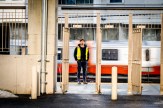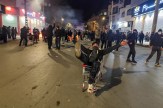Student research journal cause for celebration
Space junk — as big as a broken satellite or as small as a speck of paint — is potentially catastrophic, according to Northeastern University student researcher Evan Sankey.
“Two clouds of junk could collide with each other and render entire orbits unusable,” says Sankey, a third-year economics major whose research on space law was recently published in ECONPress, an undergraduate research journal founded by Northeastern students last year.
Students celebrated the release of the fall 2010 issue of ECONPress on Dec. 7, in the Curry Student Center Ballroom.
Students from Northeastern, Harvard University, Boston University and New York University were published in the latest edition, which features top-quality research on topics ranging from arbitrage pricing theory to the relationship between high birth rates and economic growth.
Sankey’s paper argues that giving space agencies property rights to specific locations on the moon would mitigate the impact of space junk. The issue also features an analysis of the history of poverty in the United States by Northeastern alumnus and ECONPress cofounder Angel Roque.
The publication provides student-centric learning opportunities and builds relationships with faculty through the encouragement of excellence in applied research in economics. It’s an outlet through which students can share their research with classmates, professors and other students around the country.
“Students are formidable minds,” senior economics major Franco Solleza, the journal’s editor-in-chief and cofounder, told some 50 students who attended the event. “ECONPress allows them to explore economic principals beyond the scope of the syllabus to create smart, insightful work.”
Sankey, who wants to work in the commercial space flight industry, says the experiential learning opportunity taught him to conduct research in a more rigorous manner and accept constructive criticism more willingly.
“I’ve become better at cherry-picking the information that I need out of other journals,” he adds, noting that he read a number of books on space law in preparation for writing the paper for his Law and Economics class.
Roque wrote his paper for a directed study with economics professor Andrew Sum, director of the Center for Labor Market Studies at Northeastern. Sum suggested articles to read and economists to study.
“Professor Sum led me the in right direction,” says Roque, who concluded that poverty has shifted from urban to suburban areas over the past several decades. “The hardest part was the editing process. I was constantly reflecting on how to write the paper in a way that captured what I discovered.”





